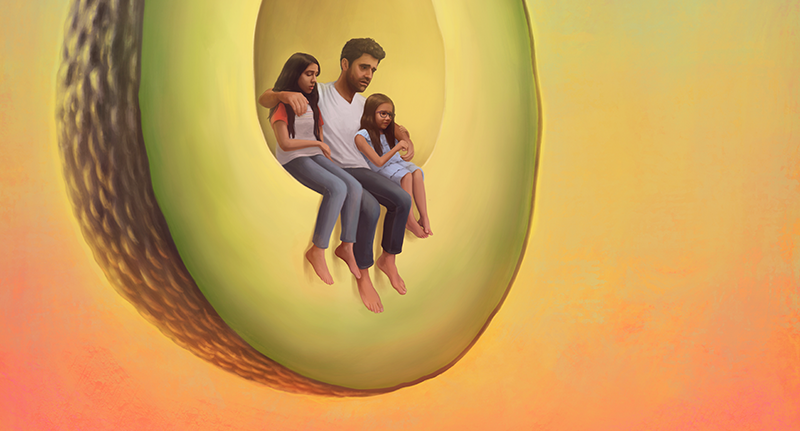The patriarch in Maria Mealla’s Bring Me An Avocado is your average good dad but a woefully inadequate parent. While George makes enough money to keep his wife Robin and two kids on the “good toilet paper,” it’s not enough to keep Robin from worrying. He clearly loves his daughters, taking time to kick the ball around with them and play pretend. As a writer, he’s got a cool, creative job and he maintains a fit (some might even say sexy) physique. He’s living up to the expectations of his sex.
But when his wife Robin is put in a coma for weeks, he can’t really keep it together. Turns out, he doesn’t actually know how to care for his kids. How to get them dressed and ready for school. How to feed them more than just PB&Js. He’s the type of father-figure we’ve come to accept, even praise: there, but mostly for the fun stuff. With George skating by on his male privilege, Robin’s been doing the invisible heavy lifting. The fact is that he is the kind of dad nurses smile at in hospital rooms but not the kind who takes care of their kids when no one’s watching.
So Robin’s sister Greece and best-friend Jada step in to help. They make the food, get the kids dressed. George protests, declaring more than once “I’ve been alone with my kids before!” But he always relents, accepting the help. He’s a somewhat hapless male figure and “Bring Me An Avocado” reveals the way his maleness has kept him sheltered and incompetent.

But the film isn’t really his, even though he’s the central character on the poster and the one with the most screen time. Bring Me An Avocado is actually Robin’s film, despite the fact she spends most of it “sleeping” at the hospital. You see, it’s Robin’s chosen community — her best friend, her sister — who step into taking care of the kids. And it’s Robin’s work that powers their world, the house she decorated, the man she married, the family she had, the friends she surrounded them with.
Not that things go great for Robin. Arguably both Greece and Jada betray her. We don’t learn much about our three principle women, but we do know that Robin is the one who took the most traditional path. She’s the only wife and the only mother out of the three.
Greece is the hippy free spirit who does things like extoll the virtues of vegan food. At one point, George tells her “you can barely take care of yourself,” but nonetheless, there Greece is taking care of him and his kids because, thanks to her female upbringing, she knows how. It’s unclear if Greece wants to sleep with George but she certainly toys with the idea of taking her sister’s place, at one point putting on her dress and a mask Robin wore so she’s indistinguishable from her sister (it freaks George out rather than excites him).

Jada’s betrayal is more clear — she sleeps with George. But before she does so, she’s there disciplining the girls and doing the type of care work that George neglects (everything but playing and giving sage advice). Jada’s the career-oriented one. We never learn what she does but she does wear business casual clothes (we only see Robin in yoga pants and pajamas) and blames “work stuff” for why she’s not available.
So there you have the three paths available to modern women: mother, professional, slacker, and none of them seem particularly fulfilling. Robin does wake up in the final third of the film. She knows her home has been invaded, her place occupied. The books are ordered differently on the shelves (Jada). The fridge full of someone else’s cooking (Greece).

The film ends with Robin insisting on being alone with her “family,” organizing a road trip with George and the girls. Robin’s built this family and she wants it to work, even if it means subsuming other aspects of herself, other things that might make her happy. Meanwhile, Jada and Greece are stuck outside Robin’s home, wondering where they went. They’re no longer replacement moms, just ancillary friends.
It’s a powerful symbol and affirmation of the nuclear family. But I couldn’t help wondering if Robin really got the prize. George is not the great partner he appears to be. Without her community of women, raising those kids is just going to be harder. It’s an impossible position and the type women find themselves in all too often. Robin knows now that she is both replaceable and irreplaceable, arguably the definition of a modern woman. Our existence is defined by compromise while the men in our life just keep going obliviously on.

